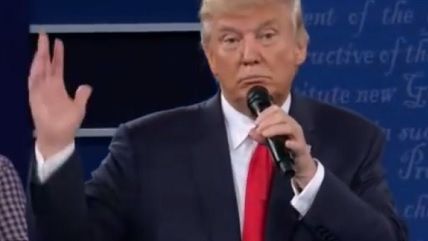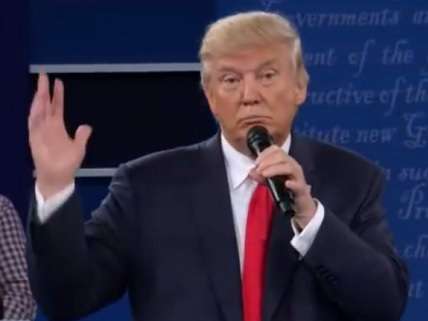Martha Raddatz Debates Donald Trump on Syria, Clinton Pushes for More Intervention, Weapons
What about Aleppo?


A question about U.S. intervention in Syria at the second presidential debate devolved into quibbling between moderator Martha Raddatz, the chief global affairs correspondent at ABC News, and Republican presidential nominee Donald Trump, that illustrated the assumptions embedded in the debate over intervention.
Raddatz read a question submitted via social media about what the candidates would "do about Syria and the humanitarian crisis in Aleppo." The question continued: "Isn't it a lot like the Holocaust when the U.S. waited too long before we helped?"
Clinton answered first, making a disturbing case to impose no-fly zones and so-called "safe zones" in Syria, because the U.S., she argued, needed "some leverage with the Russians" because Russia was "not going to come to the negotiating table for a diplomatic resolution, unless there is some leverage over them." No-fly zones easily become stepping stones for broader interventions. The U.S. previously imposed no-fly zones in places like Iraq and Libya. Russia, which has a naval base in Syria that offers it access to the Mediterranean, is unlikely to permit such a no-fly zone to be approved by the United Nations Security Council (where it holds veto power), let alone for one to be imposed without some resistance. Advocates of further U.S. intervention in Syria have not identified a compelling national security interest that might begin to justify intervention.
Raddatz's intro to the question included a reference to video of a 5-year-old boy in an ambulance who had just been pulled out of the rubble in Aleppo. What was at stake in Aleppo according to Clinton? "What is at stake here," Clinton explained, "is the ambitions and the aggressiveness of Russia. Russia has decided that it's all in, in Syria. And they've also decided who they want to see become president of the United States, too, and it's not me. I've stood up to Russia. I've taken on Putin and others, and I would do that as president." Clinton added that "wherever we can cooperate with Russia, that's fine," noting her work as secretary of state (during the famous "reset" of U.S.-Russian relations) on nuclear weapons treaties and the Iran nuclear deal.
In response to a previous question about Trump's December 2015 Muslim ban comments, Clinton referenced a picture of an injured 4-year-old in Syria who'd "been bombed by the Russian and Syrian air forces." She continued: "There are children suffering in this catastrophic war, largely, I believe, because of Russian aggression." Children suffering from U.S. actions overseas don't come up in the mainstream as reasons to reconsider interventionism.
In his own response to the question about Aleppo, Trump ridiculed Obama's "so-called line in the sand" with Russia. Clinton interrupted to complain she "was gone" by the time that happened and Trump appeared to concede the point. "You were in total contact with the White House, and perhaps, sadly, Obama probably still listened to you," Trump responded. Obama first made comments about a "red line" with Syria in 2012 when Clinton was secretary of state. In 2013, after Clinton was gone, reports of the Assad government using chemical weapons against civilians briefly led to renewed calls for the U.S. to intervene militarily in Syria. Off the cuff remarks by Secretary of State John Kerry about Assad relinquishing his chemical weapons led to Russia President Vladimir Putin offering to arrange just such a thing.
Trump then moved on to talk about the nuclear, pointing out that whole Clinton "talks tough against Russia, the U.S. nuclear program "has fallen way behind, and they've gone wild with their nuclear program," appearing to suggest the U.S. should not have entered into nuclear weapons treaty with Russia.
"Now, she talks tough, she talks really tough against Putin and against Assad," Trump continued. "She talks in favor of the rebels. She doesn't even know who the rebels are. You know, every time we take rebels, whether it's in Iraq or anywhere else, we're arming people. And you know what happens? They end up being worse than the people."
Trump brought up the removal of Qaddafi in Libya, which has since the U.S-backed intervention in 2011 seen a deteriorating security situation and the rise of ISIS. "The fact is, almost everything she's done in foreign policy has been a mistake and it's been a disaster," Trump said of Clinton's record.
"But if you look at Russia, just take a look at Russia," Trump continued, "and look at what they did this week, where I agree, she wasn't there, but possibly she's consulted. We sign a peace treaty. Everyone's all excited." The U.S. and Russia entered into an agreement last month to coordinate strikes in Syria with the stated goal of reducing the violence there. The ceasefire portion of the deal has largely collapsed.
Trump argued that Russia, Syria, and Iran (he took an aside to criticize the Iran nuclear deal, accusing Clinton of making Iran "very powerful with the dumbest deal perhaps I've ever seen in the history of deal-making, the Iran deal, with the $150 billion, with the $1.7 billion in cash, which is enough to fill up this room) were now "against" the U.S. "So she wants to fight. She wants to fight for rebels," Trump concluded. "There's only one problem. You don't even know who the rebels are. So what's the purpose? I don't like Assad at all, but Assad is killing ISIS. Russia is killing ISIS. And Iran is killing ISIS. And those three have now lined up because of our weak foreign policy."
Raddatz dismissed pretty much the entirety of Trump's answer: "Mr. Trump, let me repeat the question, what would you do about Syria and the humanitarian crisis in Aleppo?" Raddatz also noted that Mike Pence, Trump's running mate had said at the vice presidential debate that "provocations by Russia need to be met with American strength and that if Russia continues to be involved in air strikes along with the Syrian government forces of Assad, the United States of America should be prepared to use military force to strike the military targets of the Assad regime." Trump said he had not talked about the issue with Pence and disagreed with him.
"You disagree with your running mate?" Raddatz asked incredulously.
"I think you have to knock out ISIS," Trump responded. "Right now, Syria is fighting ISIS. We have people that want to fight both at the same time. But Syria is no longer Syria. Syria is Russia and it's Iran, who she made strong and Kerry and Obama made into a very powerful nation and a very rich nation, very, very quickly, very, very quickly."
Raddatz pressed on with the assumption that the U.S. had a role or responsibility in Syria: "What do you think will happen if Aleppo falls?"
"I think Aleppo is a disaster, humanitarian-wise," Trump responded.
Raddatz wanted an answer about what Trump imagined might happen in Aleppo: "What do you think will happen if it falls?"
"I think that it basically has fallen. OK? It basically has fallen," Trump responded.
Trump then moved on to a regular talking point, that the U.S. was announcing too many of its military operations to the public. "The biggest problem I have with the stupidity of our foreign policy, we have Mosul. They think a lot of the ISIS leaders are in Mosul," Trump explained. "So we have announcements coming out of Washington and coming out of Iraq, we will be attacking Mosul in three weeks or four weeks."
"Well, all of these bad leaders from ISIS are leaving Mosul. Why can't they do it quietly?" Trump asked. "Why can't they do the attack, make it a sneak attack, and after the attack is made, inform the American public that we've knocked out the leaders, we've had a tremendous success?"
"How stupid is our country?" Trump asked. Raddatz responded: "There are sometimes reasons the military does that. Psychological warfare."
"I can't think of any," Trump insisted. "I can't think of any. And I'm pretty good at it."
"It might be to help get civilians out," Raddatz, who did not appear based on her answers to have actually asked anyone responsible for decisions to announce military actions about the reasoning behind it, offered.
Trump continued, saying in his discussions with the generals, admirals, and medal of honor recipients who endorsed him the idea to "do something secretively" to "knock out the leadership" has come up.
"Tell me what your strategy is," Raddatz interrupted.
"I've been reading now for weeks about Mosul, that it's the harbor of where, you know, between Raqqa and Mosul, this is where they think the ISIS leaders are. Why would they be saying—they're not staying there anymore. They're gone. Because everybody's talking about how Iraq, which is us with our leadership, goes in to fight Mosul."
Raddatz moved back to Clinton, asking whether she would "introduce the threat of U.S. military force beyond a no-fly zone against the Assad regime to back up diplomacy," seeming to ignore the reality that imposing a no-fly zone already introduces the threat of U.S. military force beyond the scope of the no-fly zone itself. "I would not use American ground forces in Syria," Clinton nevertheless insisted, calling it a "serious mistake" just before advocating for "the use of special forces [fact check: they are ground forces], which we're using, the use of enablers and trainers in Iraq, which has had some positive effects, are very much in our interests, and so I do support what is happening."
Asked what she would do differently than President Obama, Clinton offered that she would target ISIS leadership, and specifically the self-styled caliph, Abu Bakr al-Baghdadi, which Trump had more or less said as well just a few seconds earlier. Clinton also called for arming the Kurds. "And I know there's a lot of concern about that in some circles," she added, "but I think they should have the equipment they need." The U.S.-backed intervention in Libya helped spread weapons from Nigeria to Syria, the U.S. has armed multiple, even warring sides, in the Syrian conflict, and U.S. weapons and other equipment end up, with some regularity, in the hands of ISIS. Later on in the debate Clinton talked about common sense gun control in the U.S.


Show Comments (52)